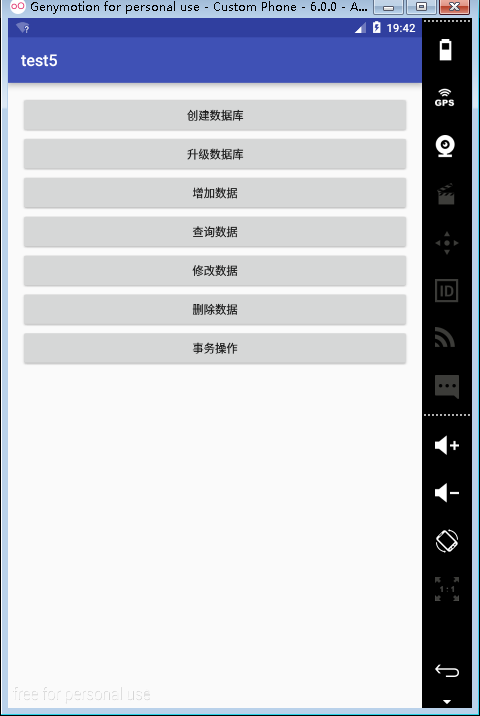Android课程---关于数据存储的学习(3)之数据库和事务
DataActivity3.java
package com.hanqi.test5; import android.content.ContentValues; import android.database.Cursor; import android.database.sqlite.SQLiteDatabase; import android.database.sqlite.SQLiteOpenHelper; import android.os.Bundle; import android.support.v7.app.AppCompatActivity; import android.util.Log; import android.view.View; import android.widget.Toast; public class DataActivity3 extends AppCompatActivity { @Override protected void onCreate(Bundle savedInstanceState) { super.onCreate(savedInstanceState); setContentView(R.layout.activity_data3); } //继承SQLiteOpenHelper class DBHelper extends SQLiteOpenHelper { //构造方法 //name 数据库名 //version 所创建的数据库版本号 public DBHelper(String name,int version) { //调用父类的构造方法,写在第一行 super(DataActivity3.this, name, null, version); } //在创建数据库时调用 //回调方法 //什么时候创建数据库:连接数据库的时候,如果数据文件不存在 //只调用一次 @Override public void onCreate(SQLiteDatabase db) { //1.创建数据库的语句 String creatTable = "create table user(_id integer PRIMARY KEY AUTOINCREMENT NOT NULL,name varchar,age int)"; db.execSQL(creatTable); //2.初始化数据 ContentValues cv = new ContentValues(); cv.put("name","房崇延"); cv.put("age", 20); //如果不成功返回-1 //第一个参数是表名 //第二个参数是空列的默认值 //第三个参数是字段和值的集合(key/value) long l = db.insert("user",null,cv); Toast.makeText(DataActivity3.this, "id = "+ l, Toast.LENGTH_LONG).show(); } //升级数据库 @Override public void onUpgrade(SQLiteDatabase db, int oldVersion, int newVersion) { //执行升级 //update user set age = 27 where _id = ? //? 是占位符,然后给占位符赋值 ContentValues cv = new ContentValues(); cv.put("age", 27); int rowcount = db.update("user",cv,"_id=? and name=?",new String[]{"1","TOM"}); Log.e("TAG","rowcount = "+rowcount); } } //创建数据库 public void dt1_OnClick(View v) { //创建 DBHelper dh = new DBHelper("test.db",1); //获取数据库实例 SQLiteDatabase sd = dh.getWritableDatabase(); sd.close(); } //升级数据库 public void dt2_OnClick(View v) { //创建 实现工具类 DBHelper dh = new DBHelper("test.db",2); //连接数据库 获取数据库实例 SQLiteDatabase sd = dh.getWritableDatabase(); sd.close(); } //插入数据 public void dt3_OnClick(View v) { //创建 DBHelper dh = new DBHelper("test.db",2); //获取数据库实例 SQLiteDatabase sd = dh.getWritableDatabase(); ContentValues cv = new ContentValues(); cv.put("name","房子"); cv.put("age", "18"); long _id = sd.insert("user", null, cv); Log.e("TAG","_id = " + _id); sd.close(); } //修改数据 public void dt5_OnClick(View v) { //创建 DBHelper dh = new DBHelper("test.db",2); //获取数据库实例 SQLiteDatabase sd = dh.getWritableDatabase(); ContentValues cv = new ContentValues(); cv.put("name","房子1"); int count = sd.update("user", cv, "_id >=3", null); Log.e("TAG", "updatecount = " + count); sd.close(); } //修改数据2 public void dt7_OnClick(View v) { //创建 DBHelper dh = new DBHelper("test.db",2); //获取数据库实例 SQLiteDatabase sd = dh.getWritableDatabase(); //没有工具类时可以用下面这个方法 但是很繁琐 // 连接 //sd = SQLiteDatabase.openOrCreateDatabase("test.db",null); //判断是否建表了,是否升级了 不如工具类好用 try { //1.开启事务 sd.beginTransaction(); ContentValues cv = new ContentValues(); cv.put("age", "50"); int count = sd.update("user", cv, "_id =2", null); //抛出异常 boolean b = true; if (b) { throw new RuntimeException("出现异常了"); } count += sd.update("user", cv, "_id =3", null); Log.e("TAG", "updatecount = " + count); //2.设置事务执行成功 sd.setTransactionSuccessful(); //提交 } catch (Exception e) { //回滚 e.printStackTrace(); Toast.makeText(DataActivity3.this, e.getMessage(), Toast.LENGTH_SHORT).show(); } //一定会被执行的代码 finally { //3.结束事务,1)提交 2)回滚 sd.endTransaction(); sd.close(); } } //删除数据 public void dt6_OnClick(View v) { //创建 DBHelper dh = new DBHelper("test.db",2); //获取数据库实例 SQLiteDatabase sd = dh.getWritableDatabase(); ContentValues cv = new ContentValues(); int count = sd.delete("user","_id =4",null); Log.e("TAG", "deletecount = " + count); sd.execSQL("delete from user where _id =3"); sd.close(); } //查询数据 public void dt4_OnClick(View v) { //创建 DBHelper dh = new DBHelper("test.db",2); //获取数据库实例 SQLiteDatabase sd = dh.getWritableDatabase(); //全表查询 Cursor cursor = sd.query("user", null, null, null, null, null, null); //Cursor 一开始会定位在第一条数据的上方 //移动游标到数据的上面,提取数据后,再继续移动 while (cursor.moveToNext()) { //cursor.getInt(0); long _id = cursor.getLong(cursor.getColumnIndex("_id")); // 不知道具体列时,可以用这个相对麻烦的方法 String name = cursor.getString(cursor.getColumnIndex("name")); int age = cursor.getInt(2); Log.e("TAG", "_id = " + _id + "name =" + name + "age = " + age); } cursor.close(); sd.close(); } }
activity_data3.xml
<?xml version="1.0" encoding="utf-8"?> <LinearLayout xmlns:android="http://schemas.android.com/apk/res/android" xmlns:tools="http://schemas.android.com/tools" android:layout_width="match_parent" android:layout_height="match_parent" android:paddingBottom="@dimen/activity_vertical_margin" android:paddingLeft="@dimen/activity_horizontal_margin" android:paddingRight="@dimen/activity_horizontal_margin" android:paddingTop="@dimen/activity_vertical_margin" tools:context="com.hanqi.test5.DataActivity3" android:orientation="vertical"> <Button android:layout_width="match_parent" android:layout_height="wrap_content" android:text="创建数据库" android:onClick="dt1_OnClick" android:id="@+id/dt_1"/> <Button android:layout_width="match_parent" android:layout_height="wrap_content" android:text="升级数据库" android:onClick="dt2_OnClick" android:id="@+id/dt_2"/> <Button android:layout_width="match_parent" android:layout_height="wrap_content" android:text="增加数据" android:onClick="dt3_OnClick" android:id="@+id/dt_3"/> <Button android:layout_width="match_parent" android:layout_height="wrap_content" android:text="查询数据" android:onClick="dt4_OnClick" android:id="@+id/dt_4"/> <Button android:layout_width="match_parent" android:layout_height="wrap_content" android:text="修改数据" android:onClick="dt5_OnClick" android:id="@+id/dt_5"/> <Button android:layout_width="match_parent" android:layout_height="wrap_content" android:text="删除数据" android:onClick="dt6_OnClick" android:id="@+id/dt_6"/> <Button android:layout_width="match_parent" android:layout_height="wrap_content" android:text="事务操作" android:onClick="dt7_OnClick" android:id="@+id/dt_7"/> </LinearLayout>
效果图:




